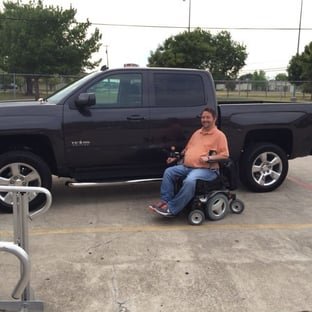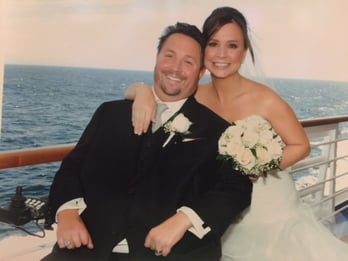Overcoming my injury | Peer Blogger TJ Griffin - Blog - Reeve Foundation
No one ever asks growing up “how would you handle living life in wheelchair?” That’s just not something you think about, I know I sure didn’t. I was an 18- year-old senior playing football never thinking that making a routine tackle would leave me a C5-C6 quadriplegic. But that’s exactly what happened to me October 19, 1990, 30 seconds before halftime. I made a great hit then immediately heard a loud crack. Next thing I knew, I was laying on the field staring at my hand that wouldn’t move and couldn’t feel anything. Right then I knew my life became more challenging.
I had so many emotions and questions going through my head. I was almost as much emotionally paralyzed as I was physically paralyzed. I had no idea how I was going to handle this huge curveball life just threw me. For the first couple of days my head was spinning. It was bad and I knew I had to try to find a way to get my emotions under control. I guess it’s only natural to constantly be thinking about walking again and living the same life you had before the injury. That was the only thing going through my mind while I was laying in that hospital bed. The more I thought about it the more depressed I felt.
However, I realized I had to stop thinking about walking again and just focus on something I could control. Over the next few days I constantly worked on moving my arm, trying to get it to move further and further each day. I noticed my depression was easing up the more progress I had. Learning to focus on short-term goals to reach my long-term goals is what got me through. Obviously, I could not control walking, I had no sensation or movement in my legs, but I forced myself not to worry about that.
After two weeks in ICU, I was transferred to an acute rehab facility where I was going to live and  breathe recovery and acceptance for the next six months. I knew the only way I was going to get the most out of the rehab was to continue my short-term goal. I asked my OT and PT to give me realistic milestones and timelines we could shoot for in the next 6 months. I even did my old athlete trick of posting my goals on the mirror so I could see them every morning to remind me what I was working towards. Physically things were going well, the goal setting and working hard in therapy was paying off. What I soon found out was that I wasn’t ready for the emotional hard work of rehabilitation.
breathe recovery and acceptance for the next six months. I knew the only way I was going to get the most out of the rehab was to continue my short-term goal. I asked my OT and PT to give me realistic milestones and timelines we could shoot for in the next 6 months. I even did my old athlete trick of posting my goals on the mirror so I could see them every morning to remind me what I was working towards. Physically things were going well, the goal setting and working hard in therapy was paying off. What I soon found out was that I wasn’t ready for the emotional hard work of rehabilitation.
I had to find a way to emotionally adjust to this life changing event. I’ve always been a positive person but even the most positive person has trouble fighting through something so traumatic. So, I took to the old saying “fake it till you make it”. Family and friends would come visit me. Immediately, when they walked in you could see the worry on their faces and the pity they felt for me. They would ask me how I was doing with this sad look on their faces and their heads turned to the side. It drove me crazy and frankly pissed me off! From that point, no matter how I felt or how bad a day I had, when someone came to see me I would immediately put on a fake smile, tell them that rehab was great, I’m working hard and progressing well. Which was true, I was seeing progress. The thing that surprised me was I noticed after about 20 minutes of fake smiling and putting on a brave face, I felt better and was in a good mood. So, I guess it’s true you can fake it till you make it.
I can’t say that it took care of everything, my family helped me immensely by supporting me and helping me when I physically couldn’t do things for myself. I think the best thing they did for me was they never treated me different. That was never more evident than with my younger brother and sister. They always treated me as their big brother. Both would come to me for advice, they would ask for help with homework. Not once did they pity me. To this day, I don’t think my family knows how much it meant to me that they never looked at me different.
By the end of my stay in rehab I felt like I was getting a handle on this whole spinal cord injury situation. My attitude was good and I had learned to set short-term goals to meet my long-term goals. An example of this was I wanted to feed myself by Christmas and, even though I had to use two different eating splints to help me, I fed myself by Christmas. In doing so my attitude was sky high. When I accomplished this major long-term goal, I was really feeling like I had everything under control. I was wrong.
Once you leave acute rehab a whole new set of questions and emotions start flooding through your head. It’s crazy, I actually thought I had everything under control. After rehab, I had to go back to school for my last two months. That first day back at school it immediately hit me that “my God I’m the only one here in a wheelchair”; my confidence was gone and I was flooded with insecurities. Which is not like me; I’ve always been a confident guy. It was ridiculous, I was rolling around campus with my head down, didn’t talk to anybody, I was so insecure.
Thank God, I had some close friends give me some tough love. They asked me “what’s your problem; why are you acting like this?” I responded, “I’m the only one in the wheelchair and everyone’s looking at me”. They laughed and said “Dude, everyone knows you’re in a wheelchair; you’ve been gone for six months in rehab and it’s been all over the school. They’re looking at you because they’re glad you’re back. You need to start acting like your same cocky self.” So once again I took to “fake it until you make it”. The next day at school I looked everybody in the eye, I was smiling and of course flirting with girls. By lunchtime I wasn’t faking it; I felt great. I was glad to be back at school and living somewhat of a normal senior in high school life.
 But I knew I needed to do more. So, I made myself go to the mall, movies, ball games, anywhere as long as I wasn’t staying inside my house. My friends were amazing they would pick me up not only for school but also take me to the movies, mall, really anywhere. At that time I still didn’t have a van, so my friends had to manually transfer me in and out of the car. There were some days they would do close to 10 transfers in a day. If I didn’t have transportation I would drive my chair through the neighborhood talking to anyone. I told myself “say YES” if someone asked me to go somewhere; if a person asked, “you doing ok” I said yes. Eventually, I finally came to the realization that the disability didn’t change me and it definitely doesn’t define me. Yes, I use a wheelchair but I’m still the same person I was before that night on October 19, 1990.
But I knew I needed to do more. So, I made myself go to the mall, movies, ball games, anywhere as long as I wasn’t staying inside my house. My friends were amazing they would pick me up not only for school but also take me to the movies, mall, really anywhere. At that time I still didn’t have a van, so my friends had to manually transfer me in and out of the car. There were some days they would do close to 10 transfers in a day. If I didn’t have transportation I would drive my chair through the neighborhood talking to anyone. I told myself “say YES” if someone asked me to go somewhere; if a person asked, “you doing ok” I said yes. Eventually, I finally came to the realization that the disability didn’t change me and it definitely doesn’t define me. Yes, I use a wheelchair but I’m still the same person I was before that night on October 19, 1990.
I guess what I’m trying to say is a spinal cord injury is life-changing, but you can get through it if you keep a positive attitude, set goals and lean on people for help. I had to learn to not only push myself physically but emotionally as well. I could never be where I am today without my family and friends. They were instrumental in giving me tough love and support at the same time.
If you’re needing some guidance, support and maybe even some tough love there is help available. There is no reason for you to feel like you’re alone with a disability. I am so proud to be part of the Christopher & Dana Reeve Foundation’s Peer & Family Support Program (PFSP) and have seen first-hand how it can change people’s lives for the positive. Everyone needs a little help from time to time just know the PFSP is here help.
TJ Griffin is a Peer Mentor Program Coordinator at the Christopher & Dana Reeve Foundation.
Join Our Movement
What started as an idea has become a national movement. With your support, we can influence policy and inspire lasting change.
Become an Advocate